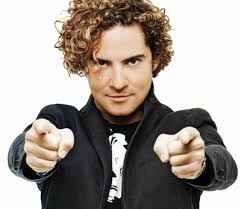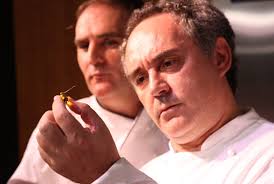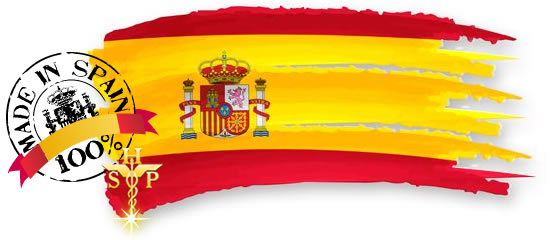Whenever I travel and the more that I do so, the more I’m convinced that having been born on this side of the world is good fortune and more so if you’re a woman. Nobody chooses where to be born, but to be European and Spanish is extraordinary; a privilege.

Americans undoubtedly have reasons to be proud, their nation is the leading power in the world, but everyone knows the fools they can make of themselves when they have to locate another country or even a continent on a world map or their unrepentant obsession of putting ketchup on everything, even shellfish. And in this way we could bash any country on Earth, but that’s not the case. Well, to each his own. But there are also those who have no love for their country and I feel sorry for them.

It must be real drag living in this embittered way. More so in Spain where we have an extraordinary history and a rich cultural heritage; we are one of the oldest nations in the world, and there are many parts of the globe where we can find traces of our ancestors.
Spain has always been diverse, but still as one in historical vocation.
It is sometimes difficult for a native of Madrid, a Galician or an Andalusian to understand what makes a Catalan or someone from Extremadura tick, or vice versa, when the truth is that there exists a wide and varied Spanish reality.

Without an understanding of what Spain has been for centuries, it is very difficult to understand what we are now. We can’t attribute to people of previous centuries attitudes which we would like to have in the XXI century. If we speak of Felipe II, we can’t expect that he be democratic . Because neither he nor anybody else in the World at that time knew what Democracy was. Adapting how things were in the past to the criteria of the present is to distort everything and is also to despise oneself, we are also what we once were.
Another important point when we speak of culture is the difference which exists between the culture of the tourist or visitor and the culture of the country where one is because there will certainly be differences between them. It’s always good to prepare before a trip, through reading, films etc… the behavioural and cultural norms of other countries, in this case Spain. Of course there’s nothing better than being able to speak the language of the country we’re visiting, an essential tool to be able to integrate with the locals… On the other hand, there is nothing worse when we travel than constantly comparing our own culture to that of the country we are visiting.

For example as Spaniards we are constantly accused of over doing the touching and kissing, and yes, being invasive, both physically and verbally. It’s necessary that those who visit us know that it’s not like that, and that for us it’s very important to touch when we speak, in the same way that our greeting is almost always followed by two kisses on the cheek or sometimes a hearty embrace. Equally important is to understand the conventions that govern Spanish conversation and what kind of pauses we use, because for many foreigners it’s very difficult to participate in a conversation or to interrupt. Also important are the gestures and the non-verbal conversation. The latter is of vital importance in our everyday communication because it permits us to clarify, complete and even modify our message.

Similarly, when people talk about Spain the same associations always arise: sun, beaches, the heat, festivals, being able to drink until the early hours of the morning, the inimitable gastronomy, the bullfighter, the flamenco dancer, siestas, bars…… But the strange thing is that when you question a foreigner in more detail about these stereotypes, they are ignorant of many things. They don’t know their origin, nor if they still continue, or whether they are things which the majority of Spanish people still continue to do; it’s just something they assume. The reality is that these things which we consider stereotypes are more than that because they actually exist in the ignorance of the foreigner. Spain is all the above and much more besides.

What do we see when we Spaniards look in the mirror? That’s simple, we see a Don Juan or a Carmen; drama, passion and sensuality but we also see a Don Quijote or a Sancho, the man who dreams, who lives, the idealist and the pragmatist, the abstract and the simple.
We the Spanish have never known how to sell our history as do the proud English or the chauvinistic French. Why? This would be another story in which we’re not going to get embroiled. What is true is that we haven’t have known how to divulge our history because first we have believed what others have said about us, from the black legend of Anglo Saxon historiography to the quaint portrait we were made to believe by the romantic travellers of the XIX century and which we have struggled to continue representing so as to remain at the top of the list of happy tourist destinations.

Who remembers the oceanographic discoveries of the Spanish? Why for centuries did the English spread the idea that Drake was the first to navigate around the world, when this journey had been made eighty years earlier by Magallanes and Elcano in 1519
If something can save the supposed brand Spain is the long list of Spanish geniuses that populate its history and culture: Cervantes, Velázquez, Lorca, Goya, Murillo, Picasso. But it has to be said that these great figures are exceptional individuals. It’s a shame that even today many Spaniards despise what shines out from our history. Part of our complex personality, full of uncertainties, lies in this vacuum.

For we the Spanish are funny, cheerful, passionate, kind, witty, cordial, hospitable, imaginative, creative with an enormous capacity for improvisation in the most difficult moments.. There is a long list, a cocktail of good adjectives and others less good. Or at least this is what the advertisements and the stereotypes say, both the positive and the negative. Yes, the mirror can provide a partial reflection of this hypothetical Spaniard, but there is also the side which is fanatical, decadent, boastful, lazy, unreliable, unpunctual and flippant. And above all, the curse of envy! Unfortunately so true. They are not my words but those of Unamuno, one of the great Spanish thinkers.
It must be that the South, the Mediterranean culture, the light, the climate…favour creativity, an open, cheerful character and a welcoming disposition. It’s not a coincidence that many Europeans choose our country as their first residence. Perhaps another of our merits is to be able to overcome difficulties. A humanistic philosophy that has allowed us to survive with a high quality of life.

If we ask a foreigner who’s just arrived in our country or one outside our borders, probably we’ll receive in reply the litany of previously cited views, and maybe this is why tourism peaks in Spain during the Summer months. But Spain is all the above and yet so much more.
Spain has a culture which is richly hued and important historically, something which should be borne in mind when visiting its towns and villages. Visiting its museums, its galleries, its most famous places and also its less famous places, will fill us with a knowledge of the many events took place in the sites we are walking through and just this will provide us with enough to take away a pleasant impression as to what is Spain and what it offers.
However its grandeur doesn’t end there. If we travel to France, to give an example, our neighbours are known, amongst other things for their pride in all that forms part of their way of life, and not only are they right but we should let a little of this characteristic chauvinism rub off on us. For we also have reasons to believe that we are great in more ways than we usually consider.

In sport we are fantastic, yes both in the great and widely recognized sports such as football, tennis, cycling but also in the smaller, lesser known activities such as swimming, badminton or skiing where we have achieved much.

Moreover, we have first class scientists, excellent doctors and health service, researchers in demand for the most prestigious international positions and we won’t even start on organ transplants. Should we talk about our actors, we come third in the list of countries which have won most Oscars in the Best Foreign Language Film category and our technicians, actors and film makers have received the golden statue in categories other than that related to the film sent by each country. We have a Spanish astronaut in NASA, Pedro Duque and we also had another there, Miguel López-Alegría, who left after ten years and ten space trips, one of which held the record for being the longest mission ever.
As regards drawing we are a real power, not only with much lauded works in the field of comics, increasingly more appreciated, and with more rounded works such as those of Carlos Giménez and Paco Roca. We also have the best billboard film poster art that the world has seen, thanks amongst others to the genius Macario Gómez, better known as MAC, whose work became so famous that Hollywood commissioned posters for the premieres from him. And let’s not forget that every day there are more Spanish artists in Pixar studios, the famous studio where Wall-E and Finding Nemo were created.

Music is another of our strengths. Both within and beyond our borders Spanish music or music created by Spanish artists in and for Latin America, has always been well received, millions of records have been sold and many concerts sold out. The Latin Grammys have paid tribute to our singers such as Enrique Iglesias or David Bisbal, who have armies of followers, and hundreds of fan clubs. And before them there was Julio Iglesias, father of Enrique or Rocío Durcal.
It’s logical to think that the majority of the stereotypes reflect ignorance of the reality, culture and history of a country. In the case of Spain, for example few people know that Spain is one of the most mountainous countries in Europe. That it is the second country in the World as to numbers of tourists it receives (around 7% of world tourism), and not only because of the sun, but it is also the second country in the world with most UNESCO World Heritage sites. Very few know that the Iberian Lynx, the most threatened feline in the world lives on the Peninsula. Everybody believes that Flamenco is the national dance but few know Tamara Rojo, the Spaniard who has been principal ballerina at the Royal London Ballet since 2000 and is the new director of the English National Ballet. Everybody knows that red wine and olive oil offer multiple health benefits, but many are unaware that Spain is the World’s primary producer of olive oil, that it has the most hectares of grapes in the world and is the second producer of wine worldwide (behind France and followed by Italy) with more than 40 million hectolitres. If you ask a Galician, an Andalusian, a native of Madrid, a Basque or a Canary Islander what dish they eat when they get together as a family, certainly they wouldn’t answer paella. Spanish gastronomy is one of the most varied in the World and has the ten of the most influential, world-recognised chefs including Juan Maria Arzak and his daughter, Elena Arzak, Ferrán Adriá and Joan Roca. Even the Spanish citizens themselves don’t know why we eat in Spain at 15:00: until 1942 we lived according to the Greenwich meridian, as do England and Portugal, but Franco, who governed Spain for more than 35 years (1939-1975), changed the time zone, bringing the clocks forward sixty minutes to bring them into line with the time that Germany had imposed in all the occupied territories.
We don’t lack reasons to love ourselves, we merely have to realize what we are worth, to be aware of it and not brush to one side all that we have achieved with our talents. And let’s not forget what remains for us to achieve in the future. I invite all of you who wish to visit us, to take a moment to prepare your visit to Spain so as to be fully informed. Books and films are our best source of inspiration before beginning a journey.
In Spain.info http://www.spain.info/es/informacion-practica/consejos-viaje/ You will find some very practical suggestions for your trip. And if you want, inhttp://www.spain.info/es/reportajes/vienes_a_espana_organiza_tu_viaje_con_el_cuaderno_de_viaje.html You can organize your trip with “The Travel Notebook” also in several languages.







